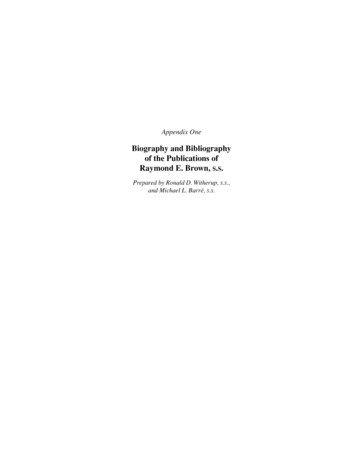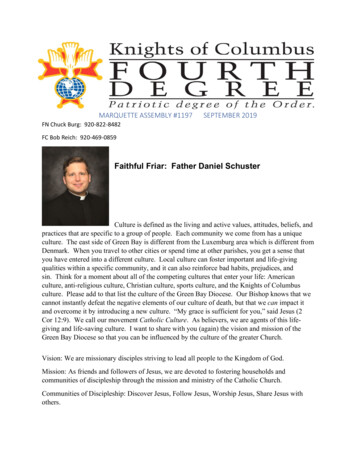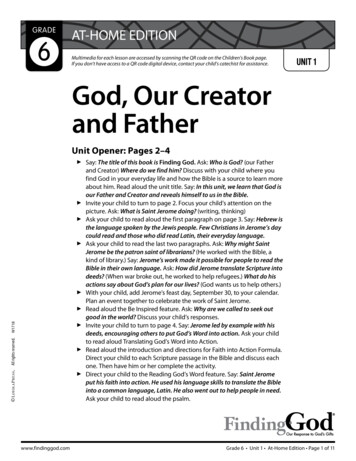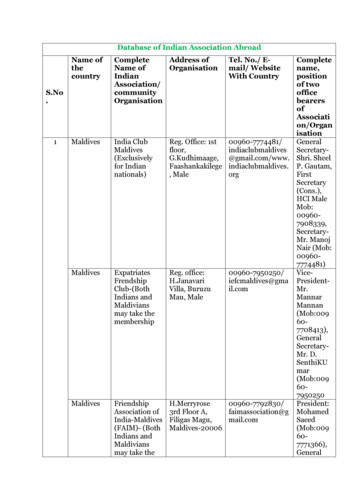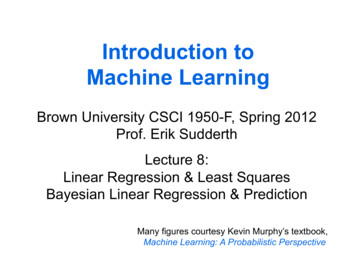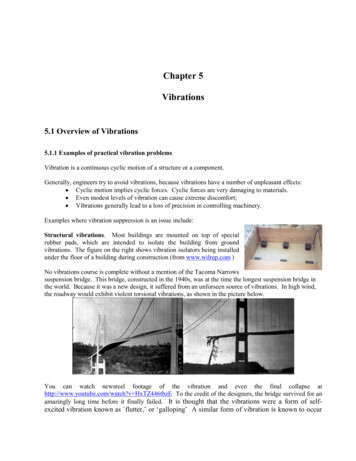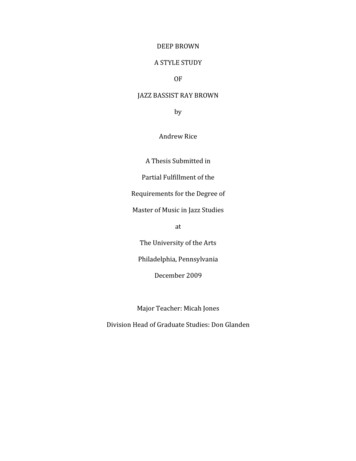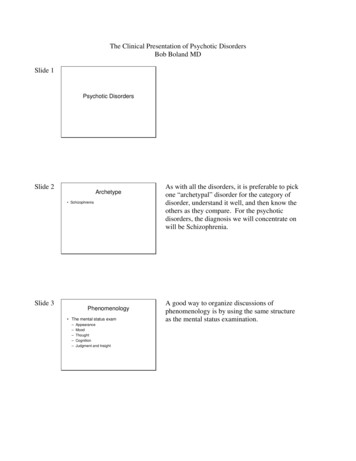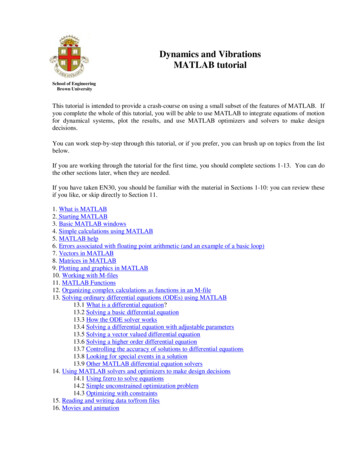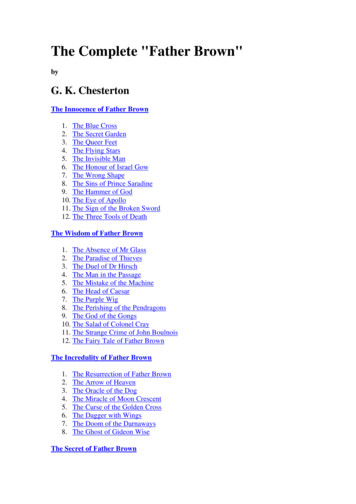
Transcription
The Complete "Father Brown"byG. K. ChestertonThe Innocence of Father Brown1. The Blue Cross2. The Secret Garden3. The Queer Feet4. The Flying Stars5. The Invisible Man6. The Honour of Israel Gow7. The Wrong Shape8. The Sins of Prince Saradine9. The Hammer of God10. The Eye of Apollo11. The Sign of the Broken Sword12. The Three Tools of DeathThe Wisdom of Father Brown1. The Absence of Mr Glass2. The Paradise of Thieves3. The Duel of Dr Hirsch4. The Man in the Passage5. The Mistake of the Machine6. The Head of Caesar7. The Purple Wig8. The Perishing of the Pendragons9. The God of the Gongs10. The Salad of Colonel Cray11. The Strange Crime of John Boulnois12. The Fairy Tale of Father BrownThe Incredulity of Father Brown1.2.3.4.5.6.7.8.The Resurrection of Father BrownThe Arrow of HeavenThe Oracle of the DogThe Miracle of Moon CrescentThe Curse of the Golden CrossThe Dagger with WingsThe Doom of the DarnawaysThe Ghost of Gideon WiseThe Secret of Father Brown
1.2.3.4.5.6.7.8.The Secret of Father BrownThe Mirror of the MagistrateThe Man With Two BeardsThe Song of the Flying FishThe Vanishing of VaudreyThe Worst Crime in the WorldThe Red Moon of MeruThe Chief Mourner of MarneThe Scandal of Father Brown1.2.3.4.5.6.7.8.9.The Scandal of Father BrownThe Quick OneThe Blast of the BookThe Green ManThe Pursuit of Mr BlueThe Crime of the CommunistThe Point of a PinThe Insoluble ProblemThe Vampire of the VillageThe Innocence of Father BrownThe Blue CrossBetween the silver ribbon of morning and the green glittering ribbon of sea, the boattouched Harwich and let loose a swarm of folk like flies, among whom the man wemust follow was by no means conspicuous — nor wished to be. There was nothingnotable about him, except a slight contrast between the holiday gaiety of his clothes andthe official gravity of his face. His clothes included a slight, pale grey jacket, a whitewaistcoat, and a silver straw hat with a grey-blue ribbon. His lean face was dark bycontrast, and ended in a curt black beard that looked Spanish and suggested anElizabethan ruff. He was smoking a cigarette with the seriousness of an idler. There wasnothing about him to indicate the fact that the grey jacket covered a loaded revolver,that the white waistcoat covered a police card, or that the straw hat covered one of themost powerful intellects in Europe. For this was Valentin himself, the head of the Parispolice and the most famous investigator of the world; and he was coming from Brusselsto London to make the greatest arrest of the century.Flambeau was in England. The police of three countries had tracked the great criminalat last from Ghent to Brussels, from Brussels to the Hook of Holland; and it wasconjectured that he would take some advantage of the unfamiliarity and confusion of theEucharistic Congress, then taking place in London. Probably he would travel as someminor clerk or secretary connected with it; but, of course, Valentin could not be certain;nobody could be certain about Flambeau.It is many years now since this colossus of crime suddenly ceased keeping the world ina turmoil; and when he ceased, as they said after the death of Roland, there was a greatquiet upon the earth. But in his best days (I mean, of course, his worst) Flambeau was afigure as statuesque and international as the Kaiser. Almost every morning the daily
paper announced that he had escaped the consequences of one extraordinary crime bycommitting another. He was a Gascon of gigantic stature and bodily daring; and thewildest tales were told of his outbursts of athletic humour; how he turned the juged’instruction upside down and stood him on his head, “to clear his mind”; how he randown the Rue de Rivoli with a policeman under each arm. It is due to him to say that hisfantastic physical strength was generally employed in such bloodless thoughundignified scenes; his real crimes were chiefly those of ingenious and wholesalerobbery. But each of his thefts was almost a new sin, and would make a story by itself.It was he who ran the great Tyrolean Dairy Company in London, with no dairies, nocows, no carts, no milk, but with some thousand subscribers. These he served by thesimple operation of moving the little milk cans outside people’s doors to the doors ofhis own customers. It was he who had kept up an unaccountable and closecorrespondence with a young lady whose whole letter-bag was intercepted, by theextraordinary trick of photographing his messages infinitesimally small upon the slidesof a microscope. A sweeping simplicity, however, marked many of his experiments. Itis said that he once repainted all the numbers in a street in the dead of night merely todivert one traveller into a trap. It is quite certain that he invented a portable pillar-box,which he put up at corners in quiet suburbs on the chance of strangers dropping postalorders into it. Lastly, he was known to be a startling acrobat; despite his huge figure, hecould leap like a grasshopper and melt into the tree-tops like a monkey. Hence the greatValentin, when he set out to find Flambeau, was perfectly aware that his adventureswould not end when he had found him.But how was he to find him? On this the great Valentin’s ideas were still in process ofsettlement.There was one thing which Flambeau, with all his dexterity of disguise, could not cover,and that was his singular height. If Valentin’s quick eye had caught a tall apple-woman,a tall grenadier, or even a tolerably tall duchess, he might have arrested them on thespot. But all along his train there was nobody that could be a disguised Flambeau, anymore than a cat could be a disguised giraffe. About the people on the boat he hadalready satisfied himself; and the people picked up at Harwich or on the journey limitedthemselves with certainty to six. There was a short railway official travelling up to theterminus, three fairly short market gardeners picked up two stations afterwards, onevery short widow lady going up from a small Essex town, and a very short RomanCatholic priest going up from a small Essex village. When it came to the last case,Valentin gave it up and almost laughed. The little priest was so much the essence ofthose Eastern flats; he had a face as round and dull as a Norfolk dumpling; he had eyesas empty as the North Sea; he had several brown paper parcels, which he was quiteincapable of collecting. The Eucharistic Congress had doubtless sucked out of theirlocal stagnation many such creatures, blind and helpless, like moles disinterred.Valentin was a sceptic in the severe style of France, and could have no love for priests.But he could have pity for them, and this one might have provoked pity in anybody. Hehad a large, shabby umbrella, which constantly fell on the floor. He did not seem toknow which was the right end of his return ticket. He explained with a moon-calfsimplicity to everybody in the carriage that he had to be careful, because he hadsomething made of real silver “with blue stones” in one of his brown-paper parcels. Hisquaint blending of Essex flatness with saintly simplicity continuously amused theFrenchman till the priest arrived (somehow) at Tottenham with all his parcels, and cameback for his umbrella. When he did the last, Valentin even had the good nature to warn
him not to take care of the silver by telling everybody about it. But to whomever hetalked, Valentin kept his eye open for someone else; he looked out steadily for anyone,rich or poor, male or female, who was well up to six feet; for Flambeau was four inchesabove it.He alighted at Liverpool Street, however, quite conscientiously secure that he had notmissed the criminal so far. He then went to Scotland Yard to regularise his position andarrange for help in case of need; he then lit another cigarette and went for a long stroll inthe streets of London. As he was walking in the streets and squares beyond Victoria, hepaused suddenly and stood. It was a quaint, quiet square, very typical of London, full ofan accidental stillness. The tall, flat houses round looked at once prosperous anduninhabited; the square of shrubbery in the centre looked as deserted as a green Pacificislet. One of the four sides was much higher than the rest, like a dais; and the line of thisside was broken by one of London’s admirable accidents — a restaurant that looked asif it had strayed from Soho. It was an unreasonably attractive object, with dwarf plantsin pots and long, striped blinds of lemon yellow and white. It stood specially high abovethe street, and in the usual patchwork way of London, a flight of steps from the streetran up to meet the front door almost as a fire-escape might run up to a first-floorwindow. Valentin stood and smoked in front of the yellow-white blinds and consideredthem long.The most incredible thing about miracles is that they happen. A few clouds in heaven docome together into the staring shape of one human eye. A tree does stand up in thelandscape of a doubtful journey in the exact and elaborate shape of a note ofinterrogation. I have seen both these things myself within the last few days. Nelson doesdie in the instant of victory; and a man named Williams does quite accidentally murdera man named Williamson; it sounds like a sort of infanticide. In short, there is in life anelement of elfin coincidence which people reckoning on the prosaic may perpetuallymiss. As it has been well expressed in the paradox of Poe, wisdom should reckon on theunforeseen.Aristide Valentin was unfathomably French; and the French intelligence is intelligencespecially and solely. He was not “a thinking machine”; for that is a brainless phrase ofmodern fatalism and materialism. A machine only is a machine because it cannot think.But he was a thinking man, and a plain man at the same time. All his wonderfulsuccesses, that looked like conjuring, had been gained by plodding logic, by clear andcommonplace French thought. The French electrify the world not by starting anyparadox, they electrify it by carrying out a truism. They carry a truism so far — as in theFrench Revolution. But exactly because Valentin understood reason, he understood thelimits of reason. Only a man who knows nothing of motors talks of motoring withoutpetrol; only a man who knows nothing of reason talks of reasoning without strong,undisputed first principles. Here he had no strong first principles. Flambeau had beenmissed at Harwich; and if he was in London at all, he might be anything from a talltramp on Wimbledon Common to a tall toast-master at the Hotel Metropole. In such anaked state of nescience, Valentin had a view and a method of his own.In such cases he reckoned on the unforeseen. In such cases, when he could not followthe train of the reasonable, he coldly and carefully followed the train of theunreasonable. Instead of going to the right places — banks, police stations, rendezvous— he systematically went to the wrong places; knocked at every empty house, turned
down every cul de sac, went up every lane blocked with rubbish, went round everycrescent that led him uselessly out of the way. He defended this crazy course quitelogically. He said that if one had a clue this was the worst way; but if one had no clue atall it was the best, because there was just the chance that any oddity that caught the eyeof the pursuer might be the same that had caught the eye of the pursued. Somewhere aman must begin, and it had better be just where another man might stop. Somethingabout that flight of steps up to the shop, something about the quietude and quaintness ofthe restaurant, roused all the detective’s rare romantic fancy and made him resolve tostrike at random. He went up the steps, and sitting down at a table by the window, askedfor a cup of black coffee.It was half-way through the morning, and he had not breakfasted; the slight litter ofother breakfasts stood about on the table to remind him of his hunger; and adding apoached egg to his order, he proceeded musingly to shake some white sugar into hiscoffee, thinking all the time about Flambeau. He remembered how Flambeau hadescaped, once by a pair of nail scissors, and once by a house on fire; once by having topay for an unstamped letter, and once by getting people to look through a telescope at acomet that might destroy the world. He thought his detective brain as good as thecriminal’s, which was true. But he fully realised the disadvantage. “The criminal is thecreative artist; the detective only the critic,” he said with a sour smile, and lifted hiscoffee cup to his lips slowly, and put it down very quickly. He had put salt in it.He looked at the vessel from which the silvery powder had come; it was certainly asugar-basin; as unmistakably meant for sugar as a champagne-bottle for champagne. Hewondered why they should keep salt in it. He looked to see if there were any moreorthodox vessels. Yes; there were two salt-cellars quite full. Perhaps there was somespeciality in the condiment in the salt-cellars. He tasted it; it was sugar. Then he lookedround at the restaurant with a refreshed air of interest, to see if there were any othertraces of that singular artistic taste which puts the sugar in the salt-cellars and the salt inthe sugar-basin. Except for an odd splash of some dark fluid on one of the whitepapered walls, the whole place appeared neat, cheerful and ordinary. He rang the bellfor the waiter.When that official hurried up, fuzzy-haired and somewhat blear-eyed at that early hour,the detective (who was not without an appreciation of the simpler forms of humour)asked him to taste the sugar and see if it was up to the high reputation of the hotel. Theresult was that the waiter yawned suddenly and woke up.“Do you play this delicate joke on your customers every morning?” inquired Valentin.“Does changing the salt and sugar never pall on you as a jest?”The waiter, when this irony grew clearer, stammeringly assured him that theestablishment had certainly no such intention; it must be a most curious mistake. Hepicked up the sugar-basin and looked at it; he picked up the salt-cellar and looked atthat, his face growing more and more bewildered. At last he abruptly excused himself,and hurrying away, returned in a few seconds with the proprietor. The proprietor alsoexamined the sugar-basin and then the salt-cellar; the proprietor also looked bewildered.Suddenly the waiter seemed to grow inarticulate with a rush of words.
“I zink,” he stuttered eagerly, “I zink it is those two clergy-men.”“What two clergymen?”“The two clergymen,” said the waiter, “that threw soup at the wall.”“Threw soup at the wall?” repeated Valentin, feeling sure this must be some singularItalian metaphor.“Yes, yes,” said the attendant excitedly, and pointed at the dark splash on the whitepaper; “threw it over there on the wall.”Valentin looked his query at the proprietor, who came to his rescue with fuller reports.“Yes, sir,” he said, “it’s quite true, though I don’t suppose it has anything to do with thesugar and salt. Two clergymen came in and drank soup here very early, as soon as theshutters were taken down. They were both very quiet, respectable people; one of thempaid the bill and went out; the other, who seemed a slower coach altogether, was someminutes longer getting his things together. But he went at last. Only, the instant beforehe stepped into the street he deliberately picked up his cup, which he had only halfemptied, and threw the soup slap on the wall. I was in the back room myself, and so wasthe waiter; so I could only rush out in time to find the wall splashed and the shop empty.It don’t do any particular damage, but it was confounded cheek; and I tried to catch themen in the street. They were too far off though; I only noticed they went round the nextcorner into Carstairs Street.”The detective was on his feet, hat settled and stick in hand. He had already decided thatin the universal darkness of his mind he could only follow the first odd finger thatpointed; and this finger was odd enough. Paying his bill and clashing the glass doorsbehind him, he was soon swinging round into the other street.It was fortunate that even in such fevered moments his eye was cool and quick.Something in a shop-front went by him like a mere flash; yet he went back to look at it.The shop was a popular greengrocer and fruiterer’s, an array of goods set out in theopen air and plainly ticketed with their names and prices. In the two most prominentcompartments were two heaps, of oranges and of nuts respectively. On the heap of nutslay a scrap of cardboard, on which was written in bold, blue chalk, “Best tangerineoranges, two a penny.” On the oranges was the equally clear and exact description,“Finest Brazil nuts, 4d. a lb.” M. Valentin looked at these two placards and fancied hehad met this highly subtle form of humour before, and that somewhat recently. He drewthe attention of the red-faced fruiterer, who was looking rather sullenly up and down thestreet, to this inaccuracy in his advertisements. The fruiterer said nothing, but sharplyput each card into its proper place. The detective, leaning elegantly on his walking-cane,continued to scrutinise the shop. At last he said, “Pray excuse my apparent irrelevance,my good sir, but I should like to ask you a question in experimental psychology and theassociation of ideas.”The red-faced shopman regarded him with an eye of menace; but he continued gaily,swinging his cane, “Why,” he pursued, “why are two tickets wrongly placed in agreengrocer’s shop like a shovel hat that has come to London for a holiday? Or, in case
I do not make myself clear, what is the mystical association which connects the idea ofnuts marked as oranges with the idea of two clergymen, one tall and the other short?”The eyes of the tradesman stood out of his head like a snail’s; he really seemed for aninstant likely to fling himself upon the stranger. At last he stammered angrily: “I don’tknow what you ‘ave to do with it, but if you’re one of their friends, you can tell ’emfrom me that I’ll knock their silly ‘eads off, parsons or no parsons, if they upset myapples again.”“Indeed?” asked the detective, with great sympathy. “Did they upset your apples?”“One of ’em did,” said the heated shopman; “rolled ’em all over the street. I’d ‘avecaught the fool but for havin’ to pick ’em up.”“Which way did these parsons go?” asked Valentin.“Up that second road on the left-hand side, and then across the square,” said the otherpromptly.“Thanks,” replied Valentin, and vanished like a fairy. On the other side of the secondsquare he found a policeman, and said: “This is urgent, constable; have you seen twoclergymen in shovel hats?”The policeman began to chuckle heavily. “I ‘ave, sir; and if you arst me, one of ’em wasdrunk. He stood in the middle of the road that bewildered that — ”“Which way did they go?” snapped Valentin.“They took one of them yellow buses over there,” answered the man; “them that go toHampstead.”Valentin produced his official card and said very rapidly: “Call up two of your men tocome with me in pursuit,” and crossed the road with such contagious energy that theponderous policeman was moved to almost agile obedience. In a minute and a half theFrench detective was joined on the opposite pavement by an inspector and a man inplain clothes.“Well, sir,” began the former, with smiling importance, “and what may — ?”Valentin pointed suddenly with his cane. “I’ll tell you on the top of that omnibus,” hesaid, and was darting and dodging across the tangle of the traffic. When all three sankpanting on the top seats of the yellow vehicle, the inspector said: “We could go fourtimes as quick in a taxi.”“Quite true,” replied their leader placidly, “if we only had an idea of where we weregoing.”“Well, where are you going?” asked the other, staring.
Valentin smoked frowningly for a few seconds; then, removing his cigarette, he said: “Ifyou know what a man’s doing, get in front of him; but if you want to guess what he’sdoing, keep behind him. Stray when he strays; stop when he stops; travel as slowly ashe. Then you may see what he saw and may act as he acted. All we can do is to keep oureyes skinned for a queer thing.”“What sort of queer thing do you mean?” asked the inspector.“Any sort of queer thing,” answered Valentin, and relapsed into obstinate silence.The yellow omnibus crawled up the northern roads for what seemed like hours on end;the great detective would not explain further, and perhaps his assistants felt a silent andgrowing doubt of his errand. Perhaps, also, they felt a silent and growing desire forlunch, for the hours crept long past the normal luncheon hour, and the long roads of theNorth London suburbs seemed to shoot out into length after length like an infernaltelescope. It was one of those journeys on which a man perpetually feels that now at lasthe must have come to the end of the universe, and then finds he has only come to thebeginning of Tufnell Park. London died away in draggled taverns and dreary scrubs,and then was unaccountably born again in blazing high streets and blatant hotels. It waslike passing through thirteen separate vulgar cities all just touching each other. Butthough the winter twilight was already threatening the road ahead of them, the Parisiandetective still sat silent and watchful, eyeing the frontage of the streets that slid by oneither side. By the time they had left Camden Town behind, the policemen were nearlyasleep; at least, they gave something like a jump as Valentin leapt erect, struck a handon each man’s shoulder, and shouted to the driver to stop.They tumbled down the steps into the road without realising why they had beendislodged; when they looked round for enlightenment they found Valentin triumphantlypointing his finger towards a window on the left side of the road. It was a large window,forming part of the long facade of a gilt and palatial public-house; it was the partreserved for respectable dining, and labelled “Restaurant.” This window, like all the restalong the frontage of the hotel, was of frosted and figured glass; but in the middle of itwas a big, black smash, like a star in the ice.“Our cue at last,” cried Valentin, waving his stick; “the place with the broken window.”“What window? What cue?” asked his principal assistant. “Why, what proof is therethat this has anything to do with them?”Valentin almost broke his bamboo stick with rage.“Proof!” he cried. “Good God! the man is looking for proof! Why, of course, thechances are twenty to one that it has nothing to do with them. But what else can we do?Don’t you see we must either follow one wild possibility or else go home to bed?” Hebanged his way into the restaurant, followed by his companions, and they were soonseated at a late luncheon at a little table, and looked at the star of smashed glass fromthe inside. Not that it was very informative to them even then.“Got your window broken, I see,” said Valentin to the waiter as he paid the bill.
“Yes, sir,” answered the attendant, bending busily over the change, to which Valentinsilently added an enormous tip. The waiter straightened himself with mild butunmistakable animation.“Ah, yes, sir,” he said. “Very odd thing, that, sir.”“Indeed?” Tell us about it,” said the detective with careless curiosity.“Well, two gents in black came in,” said the waiter; “two of those foreign parsons thatare running about. They had a cheap and quiet little lunch, and one of them paid for itand went out. The other was just going out to join him when I looked at my changeagain and found he’d paid me more than three times too much. ‘Here,’ I says to the chapwho was nearly out of the door, ‘you’ve paid too much.’ ‘Oh,’ he says, very cool, ‘havewe?’ ‘Yes,’ I says, and picks up the bill to show him. Well, that was a knock-out.”“What do you mean?” asked his interlocutor.“Well, I’d have sworn on seven Bibles that I’d put 4s. on that bill. But now I saw I’d put14s., as plain as paint.”“Well?” cried Valentin, moving slowly, but with burning eyes, “and then?”“The parson at the door he says all serene, ‘Sorry to confuse your accounts, but it’ll payfor the window.’ ‘What window?’ I says. ‘The one I’m going to break,’ he says, andsmashed that blessed pane with his umbrella.”All three inquirers made an exclamation; and the inspector said under his breath, “Arewe after escaped lunatics?” The waiter went on with some relish for the ridiculous story:“I was so knocked silly for a second, I couldn’t do anything. The man marched out ofthe place and joined his friend just round the corner. Then they went so quick upBullock Street that I couldn’t catch them, though I ran round the bars to do it.”“Bullock Street,” said the detective, and shot up that thoroughfare as quickly as thestrange couple he pursued.Their journey now took them through bare brick ways like tunnels; streets with fewlights and even with few windows; streets that seemed built out of the blank backs ofeverything and everywhere. Dusk was deepening, and it was not easy even for theLondon policemen to guess in what exact direction they were treading. The inspector,however, was pretty certain that they would eventually strike some part of HampsteadHeath. Abruptly one bulging gas-lit window broke the blue twilight like a bull’s-eyelantern; and Valentin stopped an instant before a little garish sweetstuff shop. After aninstant’s hesitation he went in; he stood amid the gaudy colours of the confectionerywith entire gravity and bought thirteen chocolate cigars with a certain care. He wasclearly preparing an opening; but he did not need one.An angular, elderly young woman in the shop had regarded his elegant appearance witha merely automatic inquiry; but when she saw the door behind him blocked with theblue uniform of the inspector, her eyes seemed to wake up.
“Oh,” she said, “if you’ve come about that parcel, I’ve sent it off already.”“Parcel?” repeated Valentin; and it was his turn to look inquiring.“I mean the parcel the gentleman left — the clergyman gentleman.”“For goodness’ sake,” said Valentin, leaning forward with his first real confession ofeagerness, “for Heaven’s sake tell us what happened exactly.”“Well,” said the woman a little doubtfully, “the clergymen came in about half an hourago and bought some peppermints and talked a bit, and then went off towards the Heath.But a second after, one of them runs back into the shop and says, ‘Have I left a parcel!’Well, I looked everywhere and couldn’t see one; so he says, ‘Never mind; but if itshould turn up, please post it to this address,’ and he left me the address and a shillingfor my trouble. And sure enough, though I thought I’d looked everywhere, I found he’dleft a brown paper parcel, so I posted it to the place he said. I can’t remember theaddress now; it was somewhere in Westminster. But as the thing seemed so important, Ithought perhaps the police had come about it.”“So they have,” said Valentin shortly. “Is Hampstead Heath near here?”“Straight on for fifteen minutes,” said the woman, “and you’ll come right out on theopen.” Valentin sprang out of the shop and began to run. The other detectives followedhim at a reluctant trot.The street they threaded was so narrow and shut in by shadows that when they came outunexpectedly into the void common and vast sky they were startled to find the eveningstill so light and clear. A perfect dome of peacock-green sank into gold amid theblackening trees and the dark violet distances. The glowing green tint was just deepenough to pick out in points of crystal one or two stars. All that was left of the daylightlay in a golden glitter across the edge of Hampstead and that popular hollow which iscalled the Vale of Health. The holiday makers who roam this region had not whollydispersed; a few couples sat shapelessly on benches; and here and there a distant girlstill shrieked in one of the swings. The glory of heaven deepened and darkened aroundthe sublime vulgarity of man; and standing on the slope and looking across the valley,Valentin beheld the thing which he sought.Among the black and breaking groups in that distance was one especially black whichdid not break — a group of two figures clerically clad. Though they seemed as small asinsects, Valentin could see that one of them was much smaller than the other. Thoughthe other had a student’s stoop and an inconspicuous manner, he could see that the manwas well over six feet high. He shut his teeth and went forward, whirling his stickimpatiently. By the time he had substantially diminished the distance and magnified thetwo black figures as in a vast microscope, he had perceived something else; somethingwhich startled him, and yet which he had somehow expected. Whoever was the tallpriest, there could be no doubt about the identity of the short one. It was his friend ofthe Harwich train, the stumpy little cure of Essex whom he had warned about his brownpaper parcels.
Now, so far as this went, everything fitted in finally and rationally enough. Valentin hadlearned by his inquiries that morning that a Father Brown from Essex was bringing up asilver cross with sapphires, a relic of considerable value, to show some of the foreignpriests at the congress. This undoubtedly was the “silver with blue stones”; and FatherBrown undoubtedly was the little greenhorn in the train. Now there was nothingwonderful about the fact that what Valentin had found out Flambeau had also found out;Flambeau found out everything. Also there was nothing wonderful in the fact that whenFlambeau heard of a sapphire cross he should try to steal it; that was the most naturalthing in all natural history. And most certainly there was nothing wonderful about thefact that Flambeau should have it all his own way with such a silly sheep as the manwith the umbrella and the parcels. He was the sort of man whom anybody could lead ona string to the North Pole; it was not surprising that an actor like Flambeau, dressed asanother prie
2. The Secret Garden 3. The Queer Feet 4. The Flying Stars 5. The Invisible Man 6. The Honour of Israel Gow 7. The Wrong Shape 8. The Sins of Prince Saradine 9. The Hammer of God 10. The Eye of Apollo 11. The Sign of the Broken Sword 12. The Three Tools of Death The Wisdom of Father Brown
